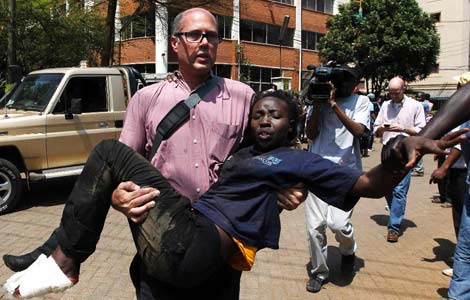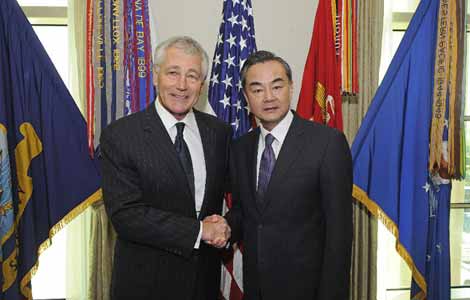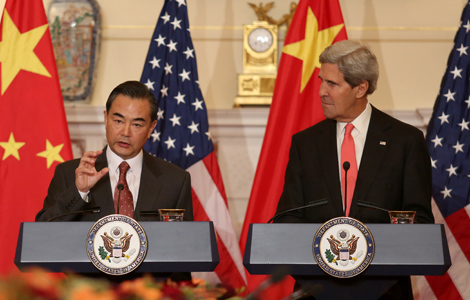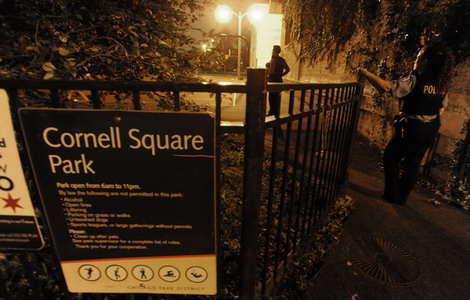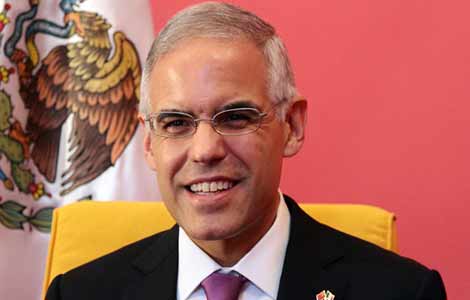Syria details part of chemical arsenal, more to come
Updated: 2013-09-21 09:28
(Agencies)
|
||||||||
THE HAGUE/BEIRUT -- Syria gave details of some of its chemical weapons to a UN-backed arms watchdog at The Hague on Friday but needs to fill in gaps by next week to launch a rapid disarmament operation that may avert US air strikes.
At the Organisation for the Prohibition of Chemical Weapons, the agency which is to oversee the removal of President Bashar al-Assad's arsenal, a spokeswoman said: "We have received part of the verification and we expect more."
She did not say what was missing from a document one UN diplomat described as "quite long". The OPCW'S 41-member Executive Council is due to meet early next week to review Syria's inventory and to agree on implementing last week's US-Russian deal to eliminate the entire arsenal in nine months.
The timetable was laid down by US Secretary of State John Kerry and Russian Foreign Minister Sergei Lavrov a week ago in Geneva when they set aside sharp differences over Syria to agree on a plan to deprive Assad of chemical weapons and so remove the immediate threat from Washington of launching military action.
That plan set a rough deadline of Saturday for Syria to give a full account of the weapons it possesses. Security experts say it has about 1,000 tonnes of mustard gas, VX and sarin - the nerve agent UN inspectors found after hundreds were killed by poison following missile strikes on rebel-held areas on August 21.
Kerry said he had spoken to Lavrov by telephone on Friday and agreed to continue cooperating, "moving not only towards the adoption of the OPCW rules and regulations, but also a resolution that is firm and strong within the United Nations".
One Western diplomat warned that a failure by Assad to account for all the suspected stockpile would cause world powers to seek action at the UN Security Council to force him to.
The US State Department said it was studying the material: "Today was a step that we're looking for in terms of an initial document," said spokeswoman Marie Harf. "We will be taking a look at it and making an assessment ... An accurate list is vital to ensure the effective implementation."
The United States and its allies said the UN inspectors' report this week left no doubt Assad's forces were responsible for the August 21 killings. Assad, however, has blamed the rebels and Moscow says the evidence of responsibility is unclear.
The Syrian government has accepted the plan and has already sought to join the OPCW. For Assad, the Russian proposal to remove chemical weapons provided an unexpected reprieve from the military action which President Barack Obama had planned after the August 21 attack. For Obama, it solved a dilemma posed when he found Congress unwilling to support war on Syria.
Once the OPCW executive has voted to follow the Lavrov-Kerry plan in a meeting expected early next week, the Security Council is due to give its endorsement of the arrangements - marking a rare consensus after two years of East-West deadlock over Syria.
However, Russia, which has a veto, remains opposed to attempts by Western powers to have the Security Council write in an explicit and immediate threat of penalties - under what are known as Chapter VII powers. It wants to discuss ways of forcing Syrian compliance only in the event Damascus fails to cooperate.
Obama has warned that he is still prepared to attack Syria, even without a UN mandate, if Assad reneges on the deal.
Most Viewed
Editor's Picks

|

|

|

|

|

|
Today's Top News
Islamists claim gun attack on Nairobi mall, 39 dead
Trending news across China
China sees drop in donations
Charges against Saudi princess in US dismissed
Super typhoon Usagi to hit S China
US not to levy punitive duties on Chinese shrimps
Philippines evacuates coast as typhoon nears
BlackBerry warns of big loss, 4,500 job cuts
US Weekly

|

|
